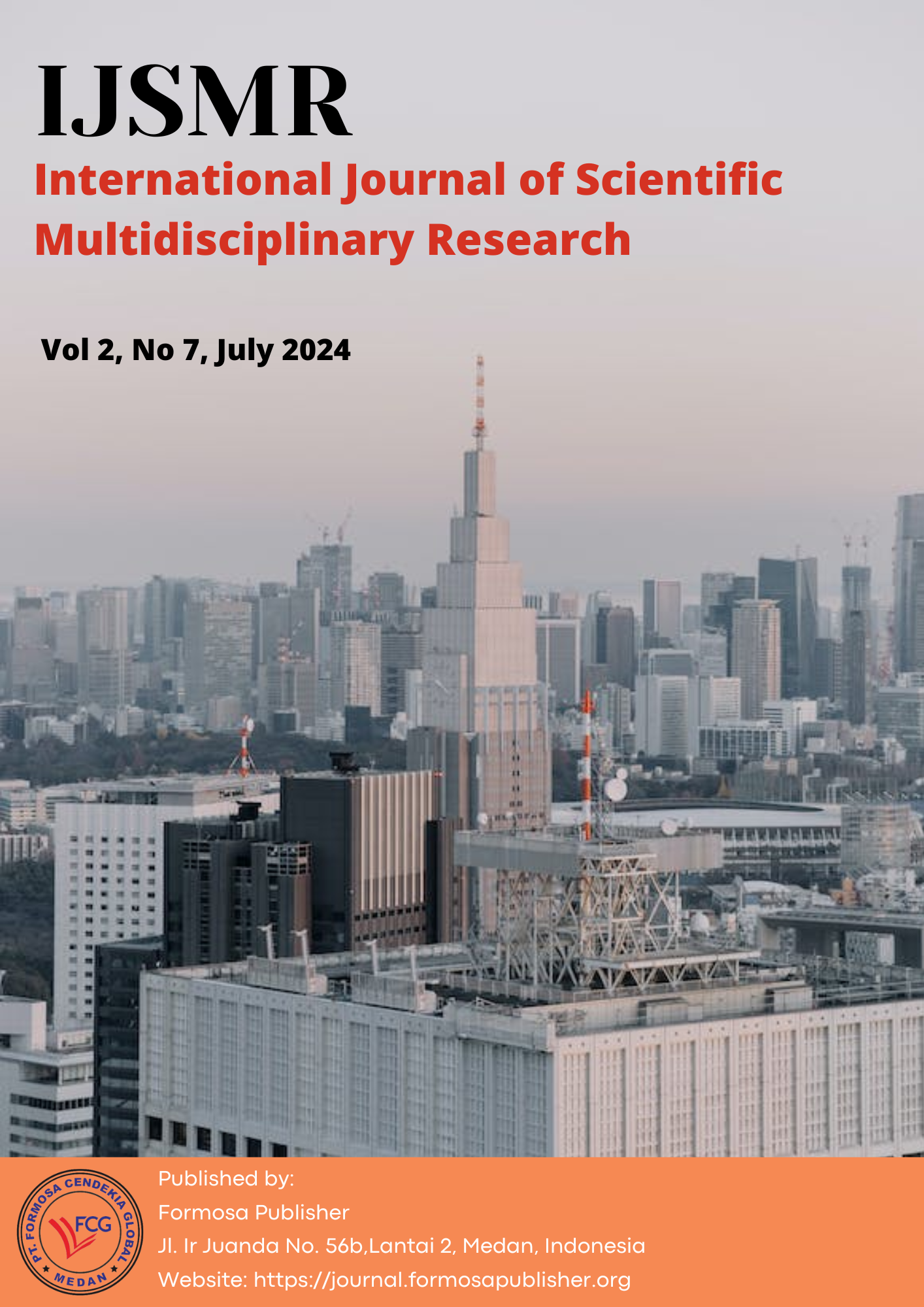The Phenomenon of Marriage Trust Issues in the Millennial Generation from A Psychological Perspective Communication in Medan City
DOI:
https://doi.org/10.55927/ijsmr.v2i7.10578Keywords:
Marital Trust Issues, Millennial Generation, Trauma, Marriage Delays, Communication PsychologyAbstract
This research aims to analyze the phenomenon of trust issues in marriage among millennials in the city of Medan, the impact of these trust issues, and the attitudes of millennials in dealing with this phenomenon. The paradigm employed is constructivism with a phenomenological method; the research object is trust issues in marriage, and the research subjects are millennials. The research informants consist of six individuals and three triangulation informants, with the information received resulting in data saturation. Data collection techniques include in-depth interviews and observations. The findings of this study indicate that marital trust issues are caused by a lack of effective communication between partners, leading to conflicts and trauma from partner betrayal, infidelity, abusive behavior, and lack of parental approval. This phenomenon is also driven by insufficient family roles, shifts in cultural values of marriage, and the negative impact of social media. Marital trust issues result in difficulties in self-disclosure, delays in marriage, and changes in values related to marriage. The attitudes developed to avoid similar experiences include improving communication with partners, enhancing trust in partners, being selective in choosing partners, and maintaining a positive mindset
Downloads
References
Anshor, A. M. (2022). The Phenomenon of Pranking the Millennial Generation: Between Sad Dzariah and Fath Dzariah. Tribakti: Jurnal Pemikiran Keislaman, 33(1), 1–16. https://doi.org/10.33367/tribakti.v33i1.1943
Bahfiarti, T. (2016). Komunikasi Keluarga (Suatu Pendekatan Keberlanjutan Regenerasi Anak Petani Kakao di Provinsi Sulawesi Utara) (1 ed.). Kedai Buku Jenny .
Benjangjoru, B., & Vongurai, R. (2018). Bahvioral Intention of Bangkokians to Adopt Mobile Payment Service by Type of Users. AU-GSB e-Journal , 11(1), 34–46.
Bungin, B. (2015). Metodologi Penelitian Kualitatif. Rajawali Pers.
Diamond, R. M., Brimhall, A. S., & Bramesfeld, K. D. (2017). Got Trust? A Mixed-Method Consideration of How Past Relationships Influence Perceptions of Trust. Journal of Divorce & Remarriage, 58(1), 64–81. https://doi.org/10.1080/10502556.2016.1268012
Handaningtias, U. R., Praceka, P. A., & Andryani, I. A. (2022). Public Discourse Regarding Polrisesuaiprosedur Hashtag as a Trust Issue. Journal of Social and Political Sciences, 5(4). https://doi.org/10.31014/aior.1991.05.04.385
Hatta, K. (2016). TRAUMA DAN PEMULIHANNYA. Dakwah Ar-Raniry Press
Liliweri, A. (2017). Komunikasi Antar Personal . Prenada Media Group.
Matondang, A. (2019). Dampak Modernisasi terhadap Kehidupan Sosial Masyarakat . Wahana Inovasi, 8(2), 188–194.
Nurudin. (2017). Ilmu Komunikasi: Ilmiah dan Populer (2 ed.). Rajawali Pers.
Nurviana, A., & Hendriani, W. (2021). Makna Pernikahan pada Generasi Milenial yang Menunda Pernikahan dan Memutuskan untuk Tidak Menikah. Buletin Riset Psikologi dan Kesehatan Mental (BRPKM), 1(2), 1037–1045. https://doi.org/10.20473/brpkm.v1i2.27995
Pramudito, A., & Minza, W. M. (2019). Dinamika Pembentukan Kembali Kepercayaan dan Keterpercayaan pada Relasi Perkawinan Pasca Terungkapnya Perselingkuhan. Universitas Gajah Mada.
Putriana, A., Koesoema, R. s, & Mukhoirotin. (2021). Psikologi Komunikasi . Yayasan kita menulis.
Rahmah, S. (2019). POLA KOMUNIKASI KELUARGA DALAM PEMBENTUKAN KEPRIBADIAN ANAK. Alhadharah: Jurnal Ilmu Dakwah, 17(33), 13. https://doi.org/10.18592/alhadharah.v17i33.2369
Rakhmat, J. (2012). Psikologi Komunikasi . PT. Remaja Rosdakarya .
Ritonga, M. H. (2019). Psikologi Komunikasi (1 ed.). Perdana Publishing .
Schilke, O., Reimann, M., & Cook, K. S. (2021). Trust in Social Relations. Annual Review of Sociology, 47(1), 239–259.
Septiani, D., Azzahra, P. N., Wulandari, S. N., & Manuardi, A. R. (2019). SELF DISCLOSURE DALAM KOMUNIKASI INTERPERSONAL: KESETIAAN, CINTA, DAN KASIH SAYANG. FOKUS (Kajian Bimbingan & Konseling dalam Pendidikan), 2(6), 265. https://doi.org/10.22460/fokus.v2i6.4128
Silalahi, J. N. (2019). Tantangan Hidup Perempuan Generasi Millennial “Berkarir atau Menikah.” Jurnal Sosiologi, 1(2), 92–100.
Sinaga, M. H., Putri, M. H., Munte, R. F., & Hasibuan, F. H. (2024). Gambaran Trauma yang Dialami Anak Korban Perceraian. As-Syar’i: Jurnal Bimbingan & Konseling Keluarga, 6(1), 248–263.
Sugiyono, & Lestari, P. (2021). Metode Penelitian Komunikasi (Kuantitatif, Kualitatif, dan Cara Mudah Menulis Artikel pada Jurnal Internasional). Alfabeta.
Thadi, R., Adisel, A., & Putri, D. (2021). Peran dan Fungsi Komunikasi Keluarga dalam Adaptasi Pranata Keluarga Islami Di Tengah Pandemi Covid-19. Jurnal Ilmiah Syi’ar, 21(1), 33. https://doi.org/10.29300/syr.v21i1.4237
Walender, J. (2017). Trust Issues: Welfare Workers’ Relationship to their Organisation [Doctoral Dissertation ]. Malardalen University.
Wang, W., & Taylor, P. (2011). For Millenials, Parenthood Trumps Marriage.
West, R., & Turner, L. H. (2008). Pengantar Teori Komunikasi Analisis dan Aplikasi (3 ed.). Penerbit Selamba Humanika
Yanto, S. (2023). Dampak Perceraian terhadap Kesehatan Jiwa Anak. Jurnal Kesehatan RSJD Dr. Amino Gundhotomo, 3(9), 1–7.
Zulkarnain, I., Asmara, S., & Sutatminingsih, R. (2019). Konsep Diri Dari Perspektif Dimensi Internal : Kajian Psikologi Komunikasi Nilai Tutur di Suku Mandailing. Jurnal Ilmiah Ilmu Komunikasi Communique, 2(1), 1–9.
Downloads
Published
How to Cite
Issue
Section
License
Copyright (c) 2024 Syifa Urahmah, Lusiana Andriani Lubis , Iskandar Zulkarnain

This work is licensed under a Creative Commons Attribution 4.0 International License.
















